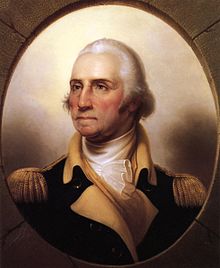
Chimney corner patriots abound; venality, corruption, prostitution of office for selfish ends, abuse of trust, perversions of funds from a national to a private use, and speculations upon the necessities of the times, pervade all interests.
Founder-in-Chief. Emperor of the
Potomac. His Excellency. The first president of
the United States.
As George
Washington prepared to return to his beloved Mount Vernon at the
end of his involuntary presidency, his biographer Joseph Ellis
tells us that he foresaw, with mounting dread, that "what was
politically essential for a viable American nation was
ideologically at odds with what it claimed to stand for." Click here for more on George Washington
The nation's First
Citizen (and his friend Benjamin Franklin) correctly perceived that
America was shaped at its moment of conception by antipodal ideals
and paradoxes. The aspirations of common men were
underwritten by deep and worrisome contradictions in the
citizenry's actions and behaviors. Nowhere were these deep
flaws more evident than in the nation's dealings with Indian
Nations, which Washington admired. Somewhere along the way to
full national maturity there would be a reckoning between what was
politically essential for national survival, and what the nation
claimed to stand for. In many respects, we are more deeply
caught in that struggle today than the nation was in 1796.
In fact,
it seems to be a little known fact that Washington attempted to
make the continued welfare of the Indians a hallmark of his
presidency. He sought to use his influence to make certain
the fate of the Indians did not 'end on a tragic note."
During his first term of office he and his secretary of war, Henry
Knox, expended more of their energies achieving this objective than
on managing diplomatic affairs with European allies.
In the
end, he returned to Mount Vernon with great forebodings. He
was deeply distrustful of the motives (and ideas) of Thomas
Jefferson, and he had profound misgivings about slavery, but
Indians were a different matter. He marshaled his waning
energies to write a farewell letter to his friends, the Cherokee
people, expressing a vision for mutual coexistence that even today
underscores the man's revolutionary boldness. "I have thought
much on this subject," he told them, "and anxiously wished that
these various Indian tribes, as well as their neighbors, the White
People, might enjoy in abundance all the good things which make
life comfortable and happy. " He closed by promising the
Cherokee leaders that if they held up their end of the solemn
treaty agreements, the federal government would defend their honor
and their rights to survival, both as a people and as independent
nations." Sadly, this was a promise many of his successors,
including Thomas Jefferson, had no intention of keeping.
Related People
Related Events
Related Flashpoints
Related Places